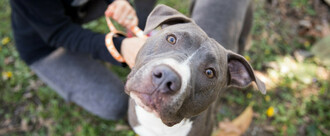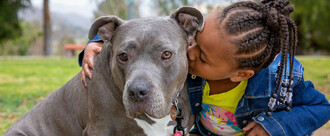-
End Breed-Restrictive Insurance Practices in KentuckyThere is a wide range of dogs falling within the category of “risk” breeds according to some insurance companies including Boxers, Giant Schnauzers, German Shepherds, Chows, Great Danes, Alaskan Malamutes, American Staffordshire Terriers, Akitas, Cane Corsos, American Bulldogs, Belgian Malinois, Keeshonds, Rhodesian Ridgebacks, Ovtcharkas, Siberian Huskies, Dobermans, Pit Bulls, Dalmatians, Rottweilers, Australian Cattle dogs and more. The National Association of Insurance Commissioners [NAIC] should protect pet-owning consumers. Insurance companies should focus on the behavior of the dog. Dogs with aggressive behavior should not be protected by any moratorium. This is important because dogs are viewed by the vast majority of Americans as part of the family, and the ability for people to keep families together should be protected. Breed-restrictive insurance practices can force responsible pet owners to give up their pets and increase the number of pets in shelters. The likelihood a dog will bite is based on many factors such as socialization of the dog, obedience training, supervision provided by the owner, and how the victim interacts with the dog. It has not been proven by scientific evidence that aggressive behavior is present in any particular breed of dog. Insurance companies that want to reduce risk should focus solely on behavior of the dog and the behavior of the owner.183 of 200 Signatures
-
End Breed-Restrictive Insurance Practices in KansasThere is a wide range of dogs falling within the category of “risk” breeds according to some insurance companies including Boxers, Giant Schnauzers, German Shepherds, Chows, Great Danes, Alaskan Malamutes, American Staffordshire Terriers, Akitas, Cane Corsos, American Bulldogs, Belgian Malinois, Keeshonds, Rhodesian Ridgebacks, Ovtcharkas, Siberian Huskies, Dobermans, Pit Bulls, Dalmatians, Rottweilers, Australian Cattle dogs and more. The National Association of Insurance Commissioners [NAIC] should protect pet-owning consumers. Insurance companies should focus on the behavior of the dog. Dogs with aggressive behavior should not be protected by any moratorium. This is important because dogs are viewed by the vast majority of Americans as part of the family, and the ability for people to keep families together should be protected. Breed-restrictive insurance practices can force responsible pet owners to give up their pets and increase the number of pets in shelters. The likelihood a dog will bite is based on many factors such as socialization of the dog, obedience training, supervision provided by the owner, and how the victim interacts with the dog. It has not been proven by scientific evidence that aggressive behavior is present in any particular breed of dog. Insurance companies that want to reduce risk should focus solely on behavior of the dog and the behavior of the owner.160 of 200 Signatures
-
End Breed-Restrictive Insurance Practices in New JerseyThere is a wide range of dogs falling within the category of “risk” breeds according to some insurance companies including Boxers, Giant Schnauzers, German Shepherds, Chows, Great Danes, Alaskan Malamutes, American Staffordshire Terriers, Akitas, Cane Corsos, American Bulldogs, Belgian Malinois, Keeshonds, Rhodesian Ridgebacks, Ovtcharkas, Siberian Huskies, Dobermans, Pit Bulls, Dalmatians, Rottweilers, Australian Cattle dogs and more. The National Association of Insurance Commissioners [NAIC] should protect pet-owning consumers. Insurance companies should focus on the behavior of the dog. Dogs with aggressive behavior should not be protected by any moratorium. This is important because dogs are viewed by the vast majority of Americans as part of the family, and the ability for people to keep families together should be protected. Breed-restrictive insurance practices can force responsible pet owners to give up their pets and increase the number of pets in shelters. The likelihood a dog will bite is based on many factors such as socialization of the dog, obedience training, supervision provided by the owner, and how the victim interacts with the dog. It has not been proven by scientific evidence that aggressive behavior is present in any particular breed of dog. Insurance companies that want to reduce risk should focus solely on behavior of the dog and the behavior of the owner.805 of 1,000 Signatures
-
End Breed-Restrictive Insurance Practices in WyomingThere is a wide range of dogs falling within the category of “risk” breeds according to some insurance companies including Boxers, Giant Schnauzers, German Shepherds, Chows, Great Danes, Alaskan Malamutes, American Staffordshire Terriers, Akitas, Cane Corsos, American Bulldogs, Belgian Malinois, Keeshonds, Rhodesian Ridgebacks, Ovtcharkas, Siberian Huskies, Dobermans, Pit Bulls, Dalmatians, Rottweilers, Australian Cattle dogs and more. The National Association of Insurance Commissioners [NAIC] should protect pet-owning consumers. Insurance companies should focus on the behavior of the dog. Dogs with aggressive behavior should not be protected by any moratorium. This is important because dogs are viewed by the vast majority of Americans as part of the family, and the ability for people to keep families together should be protected. Breed-restrictive insurance practices can force responsible pet owners to give up their pets and increase the number of pets in shelters. The likelihood a dog will bite is based on many factors such as socialization of the dog, obedience training, supervision provided by the owner, and how the victim interacts with the dog. It has not been proven by scientific evidence that aggressive behavior is present in any particular breed of dog. Insurance companies that want to reduce risk should focus solely on behavior of the dog and the behavior of the owner.137 of 200 Signatures
-
End Breed-Restrictive Insurance Practices in OregonThere is a wide range of dogs falling within the category of “risk” breeds according to some insurance companies including Boxers, Giant Schnauzers, German Shepherds, Chows, Great Danes, Alaskan Malamutes, American Staffordshire Terriers, Akitas, Cane Corsos, American Bulldogs, Belgian Malinois, Keeshonds, Rhodesian Ridgebacks, Ovtcharkas, Siberian Huskies, Dobermans, Pit Bulls, Dalmatians, Rottweilers, Australian Cattle dogs and more. The National Association of Insurance Commissioners [NAIC] should protect pet-owning consumers. Insurance companies should focus on the behavior of the dog. Dogs with aggressive behavior should not be protected by any moratorium. This is important because dogs are viewed by the vast majority of Americans as part of the family, and the ability for people to keep families together should be protected. Breed-restrictive insurance practices can force responsible pet owners to give up their pets and increase the number of pets in shelters. The likelihood a dog will bite is based on many factors such as socialization of the dog, obedience training, supervision provided by the owner, and how the victim interacts with the dog. It has not been proven by scientific evidence that aggressive behavior is present in any particular breed of dog. Insurance companies that want to reduce risk should focus solely on behavior of the dog and the behavior of the owner.372 of 400 Signatures
-
End Breed-Restrictive Insurance Practices in South CarolinaThere is a wide range of dogs falling within the category of “risk” breeds according to some insurance companies including Boxers, Giant Schnauzers, German Shepherds, Chows, Great Danes, Alaskan Malamutes, American Staffordshire Terriers, Akitas, Cane Corsos, American Bulldogs, Belgian Malinois, Keeshonds, Rhodesian Ridgebacks, Ovtcharkas, Siberian Huskies, Dobermans, Pit Bulls, Dalmatians, Rottweilers, Australian Cattle dogs and more. The National Association of Insurance Commissioners [NAIC] should protect pet-owning consumers. Insurance companies should focus on the behavior of the dog. Dogs with aggressive behavior should not be protected by any moratorium. This is important because dogs are viewed by the vast majority of Americans as part of the family, and the ability for people to keep families together should be protected. Breed-restrictive insurance practices can force responsible pet owners to give up their pets and increase the number of pets in shelters. The likelihood a dog will bite is based on many factors such as socialization of the dog, obedience training, supervision provided by the owner, and how the victim interacts with the dog. It has not been proven by scientific evidence that aggressive behavior is present in any particular breed of dog. Insurance companies that want to reduce risk should focus solely on behavior of the dog and the behavior of the owner.506 of 600 Signatures
-
End Breed-Restrictive Insurance Practices in North DakotaThere is a wide range of dogs falling within the category of “risk” breeds according to some insurance companies including Boxers, Giant Schnauzers, German Shepherds, Chows, Great Danes, Alaskan Malamutes, American Staffordshire Terriers, Akitas, Cane Corsos, American Bulldogs, Belgian Malinois, Keeshonds, Rhodesian Ridgebacks, Ovtcharkas, Siberian Huskies, Dobermans, Pit Bulls, Dalmatians, Rottweilers, Australian Cattle dogs and more. The National Association of Insurance Commissioners [NAIC] should protect pet-owning consumers. Insurance companies should focus on the behavior of the dog. Dogs with aggressive behavior should not be protected by any moratorium. This is important because dogs are viewed by the vast majority of Americans as part of the family, and the ability for people to keep families together should be protected. Breed-restrictive insurance practices can force responsible pet owners to give up their pets and increase the number of pets in shelters. The likelihood a dog will bite is based on many factors such as socialization of the dog, obedience training, supervision provided by the owner, and how the victim interacts with the dog. It has not been proven by scientific evidence that aggressive behavior is present in any particular breed of dog. Insurance companies that want to reduce risk should focus solely on behavior of the dog and the behavior of the owner.111 of 200 Signatures
-
End Breed-Restrictive Insurance Practices in North CarolinaThere is a wide range of dogs falling within the category of “risk” breeds according to some insurance companies including Boxers, Giant Schnauzers, German Shepherds, Chows, Great Danes, Alaskan Malamutes, American Staffordshire Terriers, Akitas, Cane Corsos, American Bulldogs, Belgian Malinois, Keeshonds, Rhodesian Ridgebacks, Ovtcharkas, Siberian Huskies, Dobermans, Pit Bulls, Dalmatians, Rottweilers, Australian Cattle dogs and more. The National Association of Insurance Commissioners [NAIC] should protect pet-owning consumers. Insurance companies should focus on the behavior of the dog. Dogs with aggressive behavior should not be protected by any moratorium. This is important because dogs are viewed by the vast majority of Americans as part of the family, and the ability for people to keep families together should be protected. Breed-restrictive insurance practices can force responsible pet owners to give up their pets and increase the number of pets in shelters. The likelihood a dog will bite is based on many factors such as socialization of the dog, obedience training, supervision provided by the owner, and how the victim interacts with the dog. It has not been proven by scientific evidence that aggressive behavior is present in any particular breed of dog. Insurance companies that want to reduce risk should focus solely on behavior of the dog and the behavior of the owner.660 of 800 Signatures
-
End Breed-Restrictive Insurance Practices in DelawareThere is a wide range of dogs falling within the category of “risk” breeds according to some insurance companies including Boxers, Giant Schnauzers, German Shepherds, Chows, Great Danes, Alaskan Malamutes, American Staffordshire Terriers, Akitas, Cane Corsos, American Bulldogs, Belgian Malinois, Keeshonds, Rhodesian Ridgebacks, Ovtcharkas, Siberian Huskies, Dobermans, Pit Bulls, Dalmatians, Rottweilers, Australian Cattle dogs and more. The National Association of Insurance Commissioners [NAIC] should protect pet-owning consumers. Insurance companies should focus on the behavior of the dog. Dogs with aggressive behavior should not be protected by any moratorium. This is important because dogs are viewed by the vast majority of Americans as part of the family, and the ability for people to keep families together should be protected. Breed-restrictive insurance practices can force responsible pet owners to give up their pets and increase the number of pets in shelters. The likelihood a dog will bite is based on many factors such as socialization of the dog, obedience training, supervision provided by the owner, and how the victim interacts with the dog. It has not been proven by scientific evidence that aggressive behavior is present in any particular breed of dog. Insurance companies that want to reduce risk should focus solely on behavior of the dog and the behavior of the owner.192 of 200 Signatures
-
End Breed-Restrictive Insurance Practices in MassachusettsThere is a wide range of dogs falling within the category of “risk” breeds according to some insurance companies including Boxers, Giant Schnauzers, German Shepherds, Chows, Great Danes, Alaskan Malamutes, American Staffordshire Terriers, Akitas, Cane Corsos, American Bulldogs, Belgian Malinois, Keeshonds, Rhodesian Ridgebacks, Ovtcharkas, Siberian Huskies, Dobermans, Pit Bulls, Dalmatians, Rottweilers, Australian Cattle dogs and more. The National Association of Insurance Commissioners [NAIC] should protect pet-owning consumers. Insurance companies should focus on the behavior of the dog. Dogs with aggressive behavior should not be protected by any moratorium. This is important because dogs are viewed by the vast majority of Americans as part of the family, and the ability for people to keep families together should be protected. Breed-restrictive insurance practices can force responsible pet owners to give up their pets and increase the number of pets in shelters. The likelihood a dog will bite is based on many factors such as socialization of the dog, obedience training, supervision provided by the owner, and how the victim interacts with the dog. It has not been proven by scientific evidence that aggressive behavior is present in any particular breed of dog. Insurance companies that want to reduce risk should focus solely on behavior of the dog and the behavior of the owner.1,064 of 2,000 Signatures
-
End Breed-Restrictive Insurance Practices in West VirginiaThere is a wide range of dogs falling within the category of “risk” breeds according to some insurance companies including Boxers, Giant Schnauzers, German Shepherds, Chows, Great Danes, Alaskan Malamutes, American Staffordshire Terriers, Akitas, Cane Corsos, American Bulldogs, Belgian Malinois, Keeshonds, Rhodesian Ridgebacks, Ovtcharkas, Siberian Huskies, Dobermans, Pit Bulls, Dalmatians, Rottweilers, Australian Cattle dogs and more. The National Association of Insurance Commissioners [NAIC] should protect pet-owning consumers. Insurance companies should focus on the behavior of the dog. Dogs with aggressive behavior should not be protected by any moratorium. This is important because dogs are viewed by the vast majority of Americans as part of the family, and the ability for people to keep families together should be protected. Breed-restrictive insurance practices can force responsible pet owners to give up their pets and increase the number of pets in shelters. The likelihood a dog will bite is based on many factors such as socialization of the dog, obedience training, supervision provided by the owner, and how the victim interacts with the dog. It has not been proven by scientific evidence that aggressive behavior is present in any particular breed of dog. Insurance companies that want to reduce risk should focus solely on behavior of the dog and the behavior of the owner.173 of 200 Signatures
-
End Breed-Restrictive Insurance Practices in OklahomaThere is a wide range of dogs falling within the category of “risk” breeds according to some insurance companies including Boxers, Giant Schnauzers, German Shepherds, Chows, Great Danes, Alaskan Malamutes, American Staffordshire Terriers, Akitas, Cane Corsos, American Bulldogs, Belgian Malinois, Keeshonds, Rhodesian Ridgebacks, Ovtcharkas, Siberian Huskies, Dobermans, Pit Bulls, Dalmatians, Rottweilers, Australian Cattle dogs and more. The National Association of Insurance Commissioners [NAIC] should protect pet-owning consumers. Insurance companies should focus on the behavior of the dog. Dogs with aggressive behavior should not be protected by any moratorium. This is important because dogs are viewed by the vast majority of Americans as part of the family, and the ability for people to keep families together should be protected. Breed-restrictive insurance practices can force responsible pet owners to give up their pets and increase the number of pets in shelters. The likelihood a dog will bite is based on many factors such as socialization of the dog, obedience training, supervision provided by the owner, and how the victim interacts with the dog. It has not been proven by scientific evidence that aggressive behavior is present in any particular breed of dog. Insurance companies that want to reduce risk should focus solely on behavior of the dog and the behavior of the owner.166 of 200 Signatures












